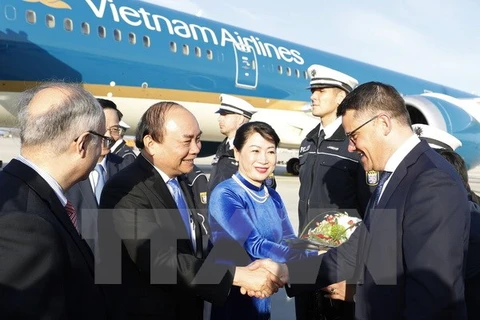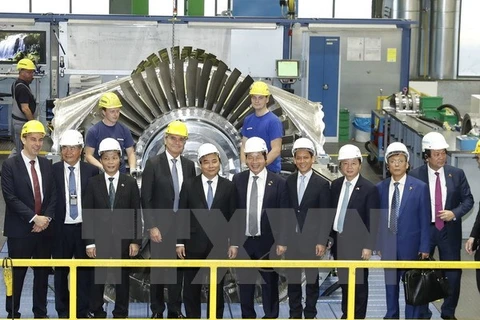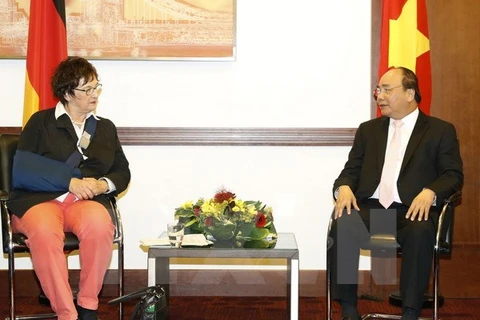Berlin (VNA) – Vietnam’s consistent policy is to consider Germany its leading important and trusted partner in Europe and hope to deepen the bilateral strategic partnership, affirmed Prime Minister Nguyen Xuan Phuc while meeting with German President Frank-Walter Steinmeier in Berlin on July 6.
The German President spoke highly of the achievements Vietnam has made during its socio-economic development, confirming that Germany always attaches importance to consolidating and developing its friendship and cooperation with Vietnam – a partner with an increasingly important role in the Asia-Pacific region.
Both sides expressed their delight at positive growth in the bilateral relations in the fields of politics-diplomacy, trade, investment, development cooperation, education-training, labour-vocational training, and science-technology.
Germany has been Vietnam’s leading trade partner in the European Union for years, with two-way trade reaching 9 billion USD last year. It is also the fifth biggest EU investor in Vietnam with a total registered capital of 1.4 billion USD.
President Steinmeier said that there is great potential for bilateral cooperation, considering a free trade agreement between Vietnam and the EU is about to be signed and the German House in Ho Chi Minh City will be put into use in the third quarter of 2017.
PM Phuc expressed his hope that Germany will encourage its businesses to intensify investments in Vietnam, especially the fields that it has strength and Vietnam has demand such as processing, manufacturing, clean energy, and food industry.
The PM pledged that Vietnam will create as open and favourable environment for foreign investors, including those from Germany.
The two leaders agreed to make joint efforts to turn the Vietnam-Germany University into a leading training and research establishment in Vietnam and the region, in order to train internationally-recognised engineers who can meet Vietnam’s development requirements in the fourth industrial revolution.
They reached a consensus on boosting technology transfer and cooperation in fields of Germany’s strength such as wind power, information technology and communications, and manufacturing.
Discussing several regional and international issues of shared concern with Phuc, President Steinmeier affirmed that Germany supports maritime freedom in the East Sea, and the settlement of disputes by peaceful means on the basis of international law, especially the United Nations Convention on the Law of the Sea 1982 and the Declaration on the Conduct of Parties in the East Sea.-VNA
The German President spoke highly of the achievements Vietnam has made during its socio-economic development, confirming that Germany always attaches importance to consolidating and developing its friendship and cooperation with Vietnam – a partner with an increasingly important role in the Asia-Pacific region.
Both sides expressed their delight at positive growth in the bilateral relations in the fields of politics-diplomacy, trade, investment, development cooperation, education-training, labour-vocational training, and science-technology.
Germany has been Vietnam’s leading trade partner in the European Union for years, with two-way trade reaching 9 billion USD last year. It is also the fifth biggest EU investor in Vietnam with a total registered capital of 1.4 billion USD.
President Steinmeier said that there is great potential for bilateral cooperation, considering a free trade agreement between Vietnam and the EU is about to be signed and the German House in Ho Chi Minh City will be put into use in the third quarter of 2017.
PM Phuc expressed his hope that Germany will encourage its businesses to intensify investments in Vietnam, especially the fields that it has strength and Vietnam has demand such as processing, manufacturing, clean energy, and food industry.
The PM pledged that Vietnam will create as open and favourable environment for foreign investors, including those from Germany.
The two leaders agreed to make joint efforts to turn the Vietnam-Germany University into a leading training and research establishment in Vietnam and the region, in order to train internationally-recognised engineers who can meet Vietnam’s development requirements in the fourth industrial revolution.
They reached a consensus on boosting technology transfer and cooperation in fields of Germany’s strength such as wind power, information technology and communications, and manufacturing.
Discussing several regional and international issues of shared concern with Phuc, President Steinmeier affirmed that Germany supports maritime freedom in the East Sea, and the settlement of disputes by peaceful means on the basis of international law, especially the United Nations Convention on the Law of the Sea 1982 and the Declaration on the Conduct of Parties in the East Sea.-VNA
VNA























